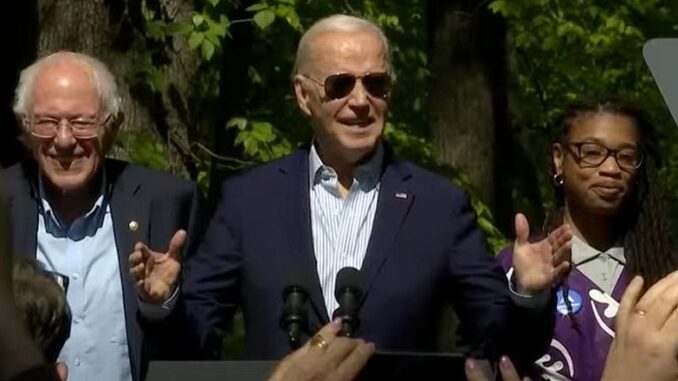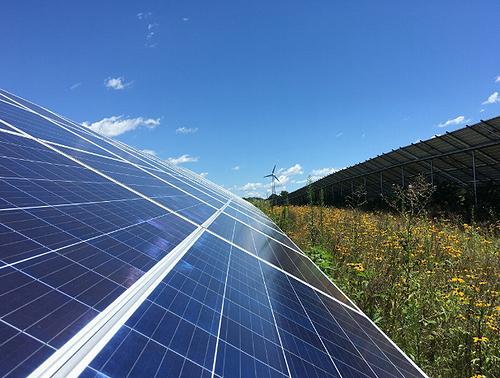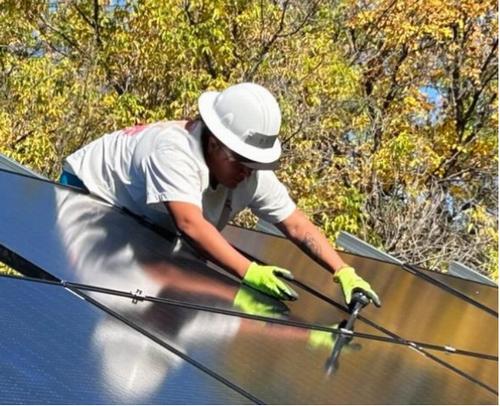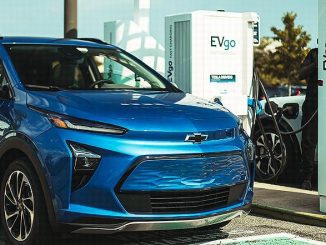
WASHINGTON, DC, April 22, 2024 (ENS) – Celebrating Earth Day today, President Joe Biden traveled to Prince William Forest Park in Triangle, Virginia, a national park site developed by President Franklin Delano Roosevelt’s Civilian Conservation Corps. Biden chose this park to unveil the first jobs rollout under his new American Climate Corps, and to announce $7 billion in solar energy grants through EPA’s Solar for All program.
Last September, President Biden took executive action to launch the American Climate Corps, a workforce training and service initiative that aims to ensure more young people have access to the skill training to grow into good-paying careers in the clean energy and climate resilience economy.
The American Climate Corps is mobilizing a new, diverse generation of more than 20,000 Americans, paying them to fight climate change, putting them to work conserving and restoring U.S. lands and waters, bolstering community resilience, deploying clean energy, implementing energy efficient technologies, and advancing environmental justice.
Biden announced that Americans can now apply to join the American Climate Corps through a newly launched website, ClimateCorps.gov.
The website will feature nearly 2,000 positions located across 36 states, Washington, DC, and Puerto Rico. These positions are hosted by hundreds of organizations advancing clean energy, conservation, and climate resilience.
The website, which is launching while still in its beta form, will be regularly updated with new American Climate Corps positions. The administration’s goal is to make it easy for any American to find work tackling the climate crisis while gaining the skills necessary for the clean energy and climate resilience workforce of the future.
The first class of the American Climate Corps will be deployed to communities across the country in June 2024.

The Biden-Harris Administration is also announcing a new partnership with the North America’s Building Trades Unions’ nonprofit partner TradesFutures.
Beginning this summer, every American Climate Corps member will have access to TradesFutures’ industry leading apprenticeship readiness curriculum during their term of service in the American Climate Corps, providing members with the opportunity to be trained in the foundational skills necessary for careers in the clean energy and climate resilience economy and putting them on a path to good paying, union jobs.
American Climate Corps members will have access to a streamlined pathway into federal service after a recent update to modernize the U.S. Office of Personnel Management’s Pathways Programs. The update will expand applicant eligibility for the Recent Graduates Program to include individuals who have completed qualifying career or technical education service within designated American Climate Corps programs.
Today, three states – Vermont, New Mexico, and Illinois – are launching new state-based climate corps programs, building on 10 states that have already launched successful climate corps programs, demonstrating the power of skills-based training as a tool to expand pathways into good-paying jobs.
These states will work with the American Climate Corps as implementing partners to ensure young people across the country are serving their communities, while participating in paid opportunities and working on projects to tackle climate change.
Additionally, beginning as a collaboration between the Department of the Interior, the Energy Communities Interagency Working Group, and AmeriCorps VISTA, a new interagency public private partnership, Energy Communities AmeriCorps, will place American Climate Corps members in priority energy communities across the country.
The program will help support community-led projects, including environmental remediation, in the places that have powered the nation for generations.
Solar for All Grants $7 Billion Worth of Funding
Today, as the world celebrates Earth Day, the U.S. Environmental Protection Agency announced 60 selectees that will receive a total of $7 billion in grant awards through the agency’s Solar for All grant competition to deliver residential solar projects to over 900,000 households nationwide.
This $7 billion investment in clean energy is expected to generate an estimated 200,000 jobs across the country. All 60 selectees intend to invest in local, clean energy workforce development programs.
The 60 selected projects will serve households in all 50 states, the District of Columbia, Puerto Rico, and territories, as well as increase access to solar for Tribes.
EPA has selected 49 state-level awards totaling $5.5 billion, six awards to Tribes totaling over $500 million, and five multistate awards totaling approximately $1 billion. The grants go to states, territories, municipalities, and nonprofits nationwide.
Solar for All will deploy residential solar for households by not only providing grants and low-cost financing to overcome financial barriers to solar installation, but also by providing services to communities to overcome other barriers such as siting, permitting, and interconnection.
“Today we’re delivering on President Biden’s promise that no community is left behind by investing $7 billion in solar energy projects for over 900,000 households in low-income and disadvantaged communities,” said EPA Administrator Michael Regan.
“The selectees will advance solar energy initiatives across the country, creating hundreds of thousands of good-paying jobs, saving $8 billion in energy costs for families, delivering cleaner air, and combating climate change,” Secretary Regan said.
For a complete list of the grantees, go to EPA’s Greenhouse Gas Reduction Fund Solar for All website. https://www.epa.gov/greenhouse-gas-reduction-fund/solar-all
They were chosen to develop long-lasting solar programs that enable low-income and disadvantaged communities to deploy and benefit from distributed residential solar.

“Sunlight is powering millions of homes across the nation, and we’re working hard to ensure Americans everywhere can benefit from this affordable clean energy resource,” Secretary of Energy Jennifer Granholm said. “The Department of Energy is proud to work alongside our partners at EPA and across the federal government to help communities access the limitless energy of the sun to light their homes and power their businesses.”
All of the funds awarded through the Solar for All program will be invested in low-income and disadvantaged communities.
In addition, this $7 billion investment is estimated to generate over $350 million in annual savings on electric bills for overburdened households, the EPA said.
Solar for All will expand existing low-income solar programs and launch new ones.
These solar grants are designed to accomplish four goals at once:
- – lower energy costs for families,
- – create good-quality jobs in communities that have been left behind,
- – advance environmental justice, and
- – tackle climate change.
The grant competition is funded by President Joe Biden’s Investing in America agenda through the Inflation Reduction Act, which created EPA’s $27 billion Greenhouse Gas Reduction Fund.
The program will also help meet the President’s goal of achieving a carbon pollution-free power sector by 2035 and net-zero emissions economy by no later than 2050.
“Solar is the cheapest form of electricity, and one of the best ways to lower energy costs for American families,” said John Podesta, senior advisor to the President for International Climate Policy. “Today’s announcement of EPA’s Solar for All awards will mean that low-income communities, and not just well-off communities, will feel the cost-saving benefits of solar thanks to this investment.”
The grantees’ projects span a broad spectrum of ways to implement solar power, and the Solar for All program is moving ahead to launch thousands more projects like these throughout every state and territory in the nation. For instance:
• The threat of storms is a major reason Athens, Georgia resident Delmira Jennings and her husband John used selected applicant Capital Good Fund’s Georgia BRIGHT leasing program to install a 13-kilowatt solar and 10-kilowatt-hour battery system in February.
“Last year, we spent two days without power after what seemed like a mini tornado,” Jennings said. After a recent outage, Jennings noted that she didn’t even know she lost power. “The batteries kicked in and all the power items we were using were on battery backup.”

• Last year, the Northern Cheyenne Tribe, whose successful pilot initiative served as the basis for selected applicant Mandan, Hidatsa, Arikara Nation’s Northern Plains Tribal Solar for All program, took major steps toward a clean energy future with the completion of the first phase of the White River Community Solar project.
This project will deploy 15 solar systems at the homes of elders while piloting a groundbreaking approach to solar ownership and management that is intended to set an example for Tribes across the nation.
• Through its Solar Access for Nationwide Affordable Housing program, selected applicant GRID Alternatives’ team in San Diego, California installed a solar energy system at Trolley Trestle, home to youth transitioning out of the foster care system.
Energy cost savings estimated at over $600,000 over 10 years, will be reinvested to provide additional services to Trolley Trestle residents, including more job and life skills training.
“Residential solar electricity leads to reduced monthly utility bills, reduced levels of air pollution in neighborhoods, and ultimately healthier communities, but too often low-income and disadvantaged communities have been left out. Today’s announcement will invest billions to ensure that affordable housing across the U.S. can access solar and increase energy efficiency and climate resilience,” Department of Housing and Urban Development Acting Secretary Adrianne Todman said.
Innovative Multi-state Southeast Rural Power Coalition
The EPA’s Solar for All grant of $156 million will enable the Southeast Rural Power Coalition – led by the nonprofit organization Groundswell – to launch and implement the Southeast Rural Power: SFA Program, delivering residential community solar, with associated energy storage, that will support community resilience throughout the region.
The program is expected to direct solar savings, savings from aligned energy efficiency improvements for low-income and disadvantaged households, and greenhouse gas emissions reduction.
The coalition consists of eligible subrecipient nonprofit electric cooperatives and municipal utilities that serve communities throughout the Southeast, one of the most impoverished and energy burdened regions in the country.
The program offers help with project development, as well as operations and maintenance support services. It offers project financing assistance, workforce development through pre-apprenticeship and apprenticeships, community outreach, and educational programs. Headquartered in Washington, DC, Groundswell will operate its SE Rural Power Coalition program in eight states throughout the American Southeast.
The program’s implementation strategy is to deliver entrepreneurship support for new developers and installers entering the market,
Groundswell serves communities in the design and construction of resilience hubs. Developed in collaboration with the people and neighborhoods they serve, resilience hubs include solar power and energy storage connected through a microgrid and provide essential services, such as keeping the lights and heat on when the power goes out.
“The United States can and must lead the world in transforming our energy systems away from fossil fuels,” U.S. Senator Bernie Sanders, a Vermont Independent, said. “The Solar for All program – legislation that I successfully introduced – will not only combat the existential threat of climate change by making solar energy available to working class families, it will also substantially lower the electric bills of Americans and create thousands of good-paying jobs. This is a win for the environment, a win for consumers, and a win for the economy.”
And for the planet and its air quality, over five years, the Solar for All program is expected to reduce 30 million metric tons of carbon dioxide equivalent emissions from over four gigawatts of solar energy capacity unlocked for low-income communities.
Solar and distributed energy resources help improve electric grid reliability and climate resilience, critical for disadvantaged communities that have long been underserved.
Featured image: At Prince William Forest Park in Triangle, Virginia celebrating Earth Day 2024, from left: U.S. Senator Bernie Sanders, a Vermont Independent, President Joe Biden, and Za’Nyia Kelly of the Michigan Healthy Climate Corps. (Screengrab from video courtesy The White House)
© 2024, Environment News Service. All rights reserved. Content may be quoted only with proper attribution and a direct link to the original article. Full reproduction is prohibited.



